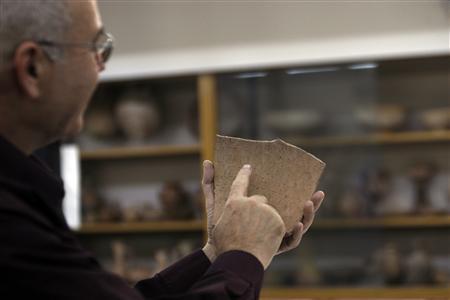Translated Hebrew Text Offers Insight Into Ark of the Covenant, Treasures From Temple of Solomon
A recently-translated Hebrew text is being reported as offering greater detail into the treasures found inside King Solomon's temple, including the Ark of the Covenant, a chest described in the Old Testament that contains the Ten Commandments.

James Davila, a professor at the University of St. Andrews, has described the details of the recently-transcribed text, known as the "Treatise of the Vessels," or "Massekhet Kelim" in Hebrew, in the recently-released book Old Testament Pseudepigrapha More Noncanonical Scriptures Volume 1.
Davila explains in the book that the Treatise of the Vessels tells how the treasures of King Solomon's temple were "concealed by a number of Levites and prophets" and "[…] hidden in various locations in the Land of Israel and in Babylonia, while others were delivered into the hands of the angels Shamshiel, Michael, Gabriel and perhaps Sariel […]"
The bible describes King Solomon's temple as the First Temple in Jerusalem on the Temple Mount. The temple was constructed by Solomon, king of the Israelites, and destroyed by Nebuchadnezzar II after 587 BCE. The temple reportedly contained many different treasures, including the stone tablets on which the 10 Commandments were written.
Although the "Treatise of the Vessels" describes how the many treasures of King Solomon's temple were scattered throughout Israel and Babylonia, it does not delve into describing what the treasures actually were, saying only that they "shall not be revealed until the day of the coming of the Messiah son of David."
There have recently been many discoveries of artifacts from ancient times that are related to the bible and Christianity. One recent discovery includes textiles from the Wadi Murabba'at caves, located south of Qumran in the West Bank, the same area where the Dead Sea Scrolls were discovered. The textiles contained the elusive "biblical blue" color made from the shells of snails and only worn by the most wealthy residents in Israel during the Roman Era. This color was also worn by high priests, and is the inspiration for the bright blue found on Israel's flag. It is mentioned in the bible's Exodus Chapter 25 and Exodus Chapter 27.
Another recent discovery includes a 1,500-year-old lantern adorned with crosses and a wine press, found back in April at the ruins of a Byzantine settlement near the city of Ashkelon, in the South District of Israel. The Christian lantern was considered an especially significant find because of its rarity, as its cross carvings were meant to project large cross symbols on the walls of a room when the lantern was lit.
A third recent discovery includes 40 wine jugs found at the site of Tel Kabri, located in northern Israel. Chemical analysis of the jugs found remnants of wine ingredients, including tartaric and syringic acid residues, and the jugs are dated as being older than the Bible and the Dead Sea Scrolls with an estimated date of 1700 B.C.
Speaking about the newly-translated "Treatise of the Vessels," Professor Davila told LiveScience that he believes the text was written as a form of fiction and does not actually detail where the real treasures of King Solomon's temple may be hidden.
"The writer draws on traditional methods of scriptural exegesis [interpretation] to deduce where the treasures might have been hidden, but I think the writer was approaching the story as a piece of entertaining fiction, not any kind of real guide for finding the lost Temple treasures."






















